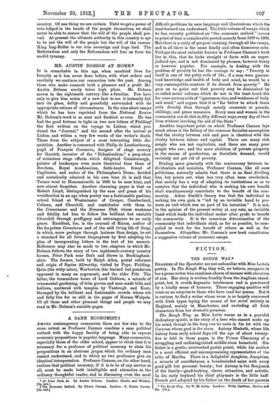MR. AUSTIN DOBSON AT HOME.* '
IT is remarkable in this age, when mankind lives for futurity as it has never done before, with what ardour and assiduity we continue our researches into the past. Among those who make research both a pleasure and a profit Mr. Austin Dobson surely takes high place. Mr. Dobson moves in the eighteenth century like a familiar. You have only to give him seisin of a new fact to see it instantly fall into its place, deftly and gracefully surrounded with its appropriate retinue of circumstance. In the nine short essays which he has here reprinted from the National Review Mr. Dobson's work is as neat and finished as ever. He has had the good fortune to light on two new letters of Fielding, the first written on the voyage to Lisbon, which pro- duced the "Journal," and the second after the arrival at Lisbon and within a very few weeks of the writer's death. These form the subject of a most interesting little dis- quisition. Another is concerned with Philip de Loutherbourg, pupil of Francois Casanova, designer of stage scenery for Garrick, inventor of the " Eidophusikon," a peep-show of miniature stage effects which delighted Gainaborough, painter of landscapes even more theatrical than those of Berchem, Royal Academician, faith-healer, friend of Cagliostro, and seeker of the Philosopher's Stone; derided and ecstatically admired in his own time (it is said that Turner went to Hammersmith in 1808 to be near him), and now almost forgotten. Another charming paper is that on Robert Lloyd, distinguished by the ease and grace of his versification in an age when poetry was a fashionable pastime, school friend at Westminster of Cowper, Cumberland, Colman, and Churchill, and contributor with them to the Connoisseur and the Nonsense Club, whose weakness and fidelity led him to follow the brilliant but unstable Churchill through profligacy and extravagance to an early grave. Excellent, too, is the account of Mason, author of the forgotten Caractacus and of the still living life of Gray, in which, more perhaps through laziness than design, he set a standard for all future biographers by first adopting the plan of incorporating letters in the text of his memoir. Reference may also be made to two chapters in which Mr. Dobson follows the story of two eighteenth-century country houses, Prior Park near Bath and Stowe in Buckingham- shire. The former, built by Ralph Allen, postal reformer and origin of Squire Allworthy, visited by Pope, Fielding, Quin (the witty actor), Warburton (his learned but ponderous opponent in many an argument), and the elder Pitt. The latter, the tremendous home of Lord Cobham, a miracle of ornamental gardening, of trim groves and man-made hills and hollows, scattered with temples by Vanbrugh and Kent, thronged by the brilliant and fashionable crowds whose wit and folly live for us still in the pages of Horace Walpole. Of all these and other pleasant things and people we may read in Mr. Dobson's amiable pages.


















































 Previous page
Previous page